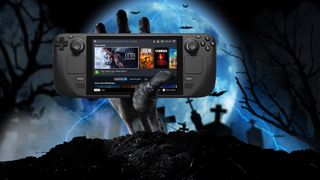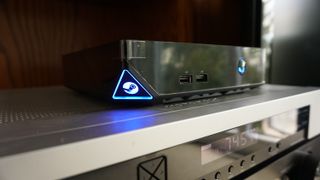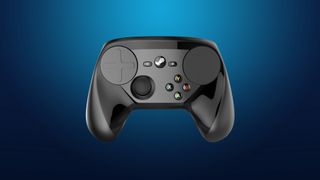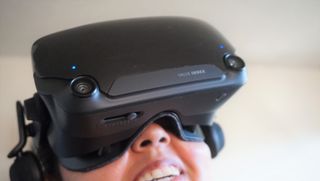Don't get too excited – the Steam Deck could easily join Valve's hardware graveyard
Gone but not forgotten

The Steam Deck has the potential to be a truly fantastic product, and given the rising popularity of PC gaming, this latest offering from Valve could be the affordable first step into the hobby for many. Given this accessibility and the general 'cool' factor of playing your steam library on a genuine handheld gaming PC, people are understandably excited, but it's worth remembering that other hardware offerings from Steam have been great pieces of tech in their own right, and that didn't stop them from getting the axe.
With the recent announcement of the Switch OLED disappointing many of even the most dedicated Nintendo fans, it was clearer than ever that another handheld gaming device was needed on the market to fill a few voids. The potential that the Steam Deck (not to be confused with the Elgato Stream Deck) has to deal a serious blow to Nintendo isn't something to be underestimated, especially given its design similarities in being both a handheld and dockable machine.
With the Steam Deck running on a new, modified version of the SteamOS (a Linux-based operating system introduced back in 2013), users will be able to download and play almost every game on their Steam library, and Valve has mentioned that this updated version of the SteamOS has been optimized to run on a handheld system, a far cry from the version that was introduced several years ago.
The dawn of the SteamOS

Our caution regarding the Steam Deck isn't unwarranted, lest we forget the Steam Machine and its Icarus-like history. For anyone that doesn't remember this particular piece of tech, Steam Machines were pre-built PCs from a number of different manufacturers that promised to run on Steam's own operating system and shake up the console gaming market. The theory was that by sitting under our TV's, PC gamers wouldn't be constricted to sitting at a desk, and as such nobody would need to throw their cash at the latest Playstation or Xbox.
Given that they fell into obscurity, it's pretty safe to say that Steam Machines didn't quite take off as planned, and there are a few good reasons why. Essentially, the situation can be boiled down to Valve trying to take on too much with a single project. A large part of SteamOS being based on Linux was also Valve's attempt to remove PC gaming's dependency on Windows, but many manufacturers ended up selling the units with Microsoft's operating system anyway due to a lack of interest in SteamOS.
And it's little wonder why, given the initial release of SteamOS 1.0 (otherwise dubbed 'alchemist') was poorly received due to being a buggy mess, which didn't make for a compelling alternative against a system that was already proven to work. A timeline of events also paints a poor picture with Steam Machines, SteamOS and Steam controllers all being announced in 2013, despite the controller and Steam Machines with SteamOS actually shipping until late 2015 thanks to Multiple delays.
This led to one of the first commercially available Steam machines releasing a little earlier in 2014 as a Windows-based machine instead. The Alienware Alpha was described as 'SteamOS ready' when it was launched, but given Valve's desire to prove that its own operating system would add needed variety to the existing PC Gaming market, it certainly wasn't a good look.
In the end, machines running SteamOS were consistently outperformed by their Windows 10-based counterparts and what little demand for the Steam Machines had persisted dried up. Valve quietly removed almost every mention of the project from its site in 2018, leaving only an empty landing page behind to this day.
Niche fan favorites

Where Steam Machines failed to take off, a cult-like following developed for the Steam Controller after its launch on November 10 2015. Its creation was to help cement Steam Machines as a suitable alternative for gaming consoles and aid the transition between long-time controller users over to a mouse and keyboard.
In fact, it did such a good job that PC users happily purchased the controller to use with their existing desktops because of its optimizations, offering a better overall experience for some than simply hooking up an Xbox controller. The Steam Controller gained a small, but dedicated fanbase that adored its unusual trackpads, customization options and haptic feedback.
Ultimately this wasn't enough to keep the Steam Controller on the shelves, and Valve made the decision to discontinue the product back in 2019, offering up the remaining stock for just $5 in a mass clearout. While Xbox and Playstation controllers are still king, the Steam Controller was a real blessing when paired with another of Valve's discontinued pieces of hardware, the Steam Link.
The Steam Link concept has been succeeded by a software alternative, but in its original, physical form, this little box made it possible to stream games or other content from your PC (or Steam Machine if you were one of the few folks to buy one) to a connected television in your house via network connectivity. This again removed the need to be desk-bound to enjoy PC gaming, allowing you to hook up a controller to the system and play any of your games from the comfort of your couch.
I fondly remember this is breathing some life into couch-coop, allowing me to connect multiple controllers and play titles like Gangbeasts, Overcooked or Castle Crashers with friends. If you have a compatible Android smart TV then you can still use many of the same features by downloading the Steam Link app, but losing the physical hardware when it was also discontinued back in 2018 was bittersweet for many.
Its not all doom and gloom

Not every Valve product has been tragically put down, though it's still early days. The Valve Index managed to sell out in 31 countries when Steam listed the VR headset with a free copy of Half Life: Alyx, and demand continues to be high. According to the Steam hardware Survey, around 16.7% of all virtual reality headsets used with Steam are the Valve Index, despite costing a whopping $999, more than twice the price of the popular $399 Oculus Rift.
If the Steam Deck treads carefully then there's hope that it will succeed, but Valve needs to have learned from its past experiences with experimental hardware releases. The demand for handheld PC gaming is definitely there (despite perfectly portable gaming laptops being readily available), and a few machines such as the Alienware Concept UFO historically gained some public attention when it was revealed at CES 2020.
In fact, you can go out and buy existing handheld gaming PCs already, such as the GPD WIN 3 or the Aya Neo, two successfully crowdfunded projects that proves genuine handheld PC gaming hardware is something that folks are more than happy to throw cash at. The market is there, the product just needs to meet the demands and expectations of its userbase.
- Stay up to date on all the latest tech news with the TechRadar newsletter
Get daily insight, inspiration and deals in your inbox
Get the hottest deals available in your inbox plus news, reviews, opinion, analysis and more from the TechRadar team.
Jess is a former TechRadar Computing writer, where she covered all aspects of Mac and PC hardware, including PC gaming and peripherals. She has been interviewed as an industry expert for the BBC, and while her educational background was in prosthetics and model-making, her true love is in tech and she has built numerous desktop computers over the last 10 years for gaming and content creation. Jess is now a journalist at The Verge.
Most Popular



